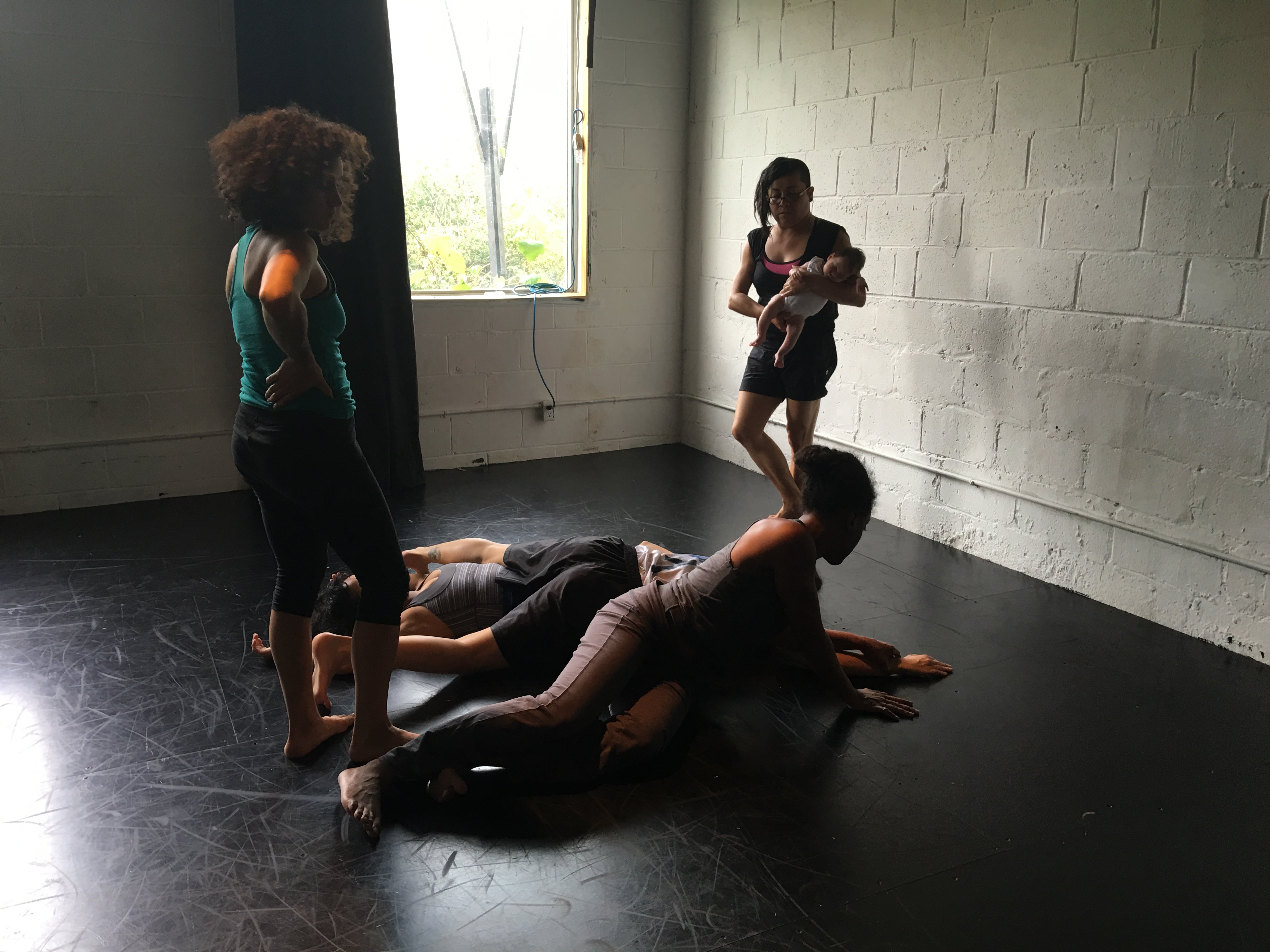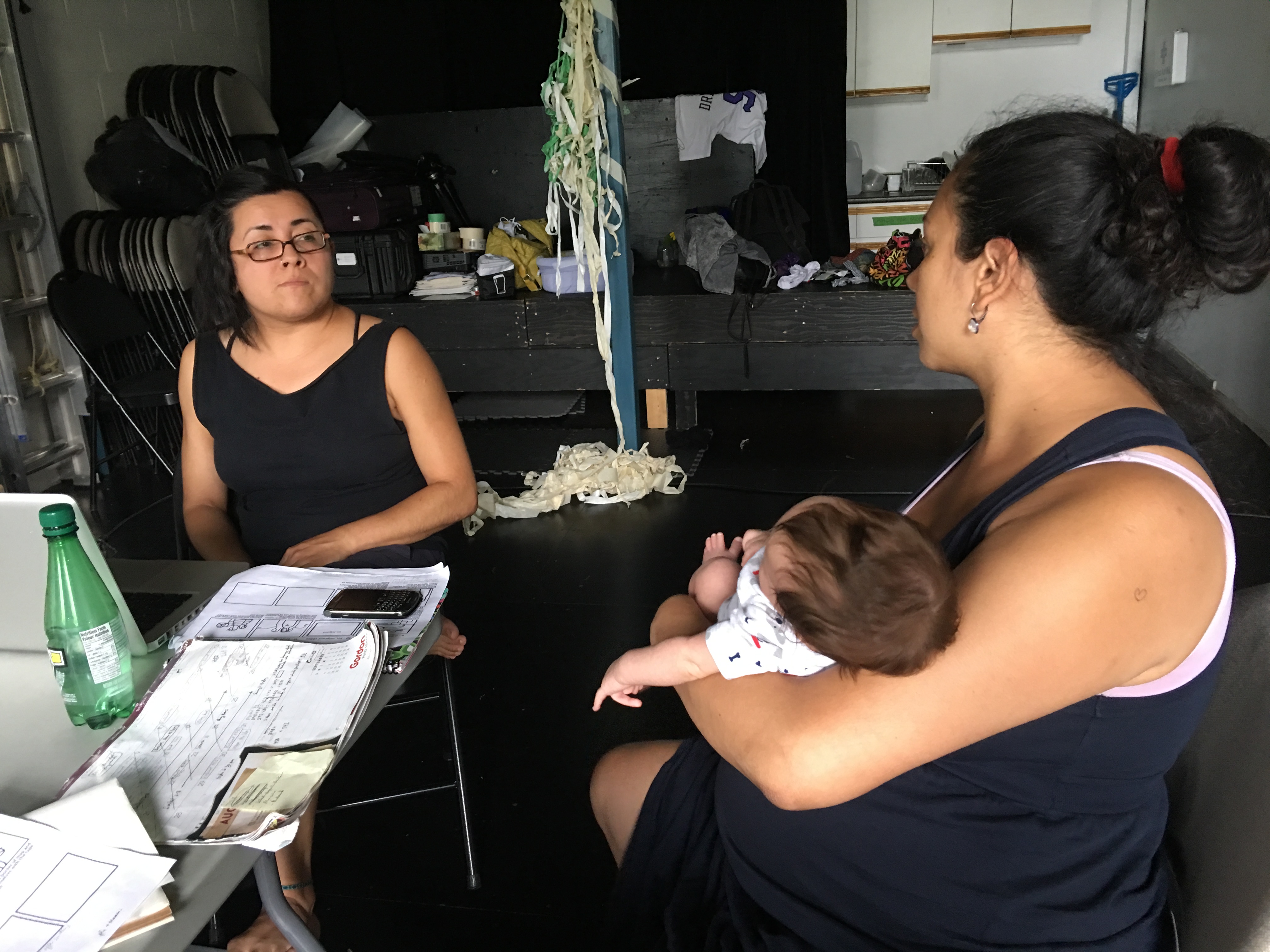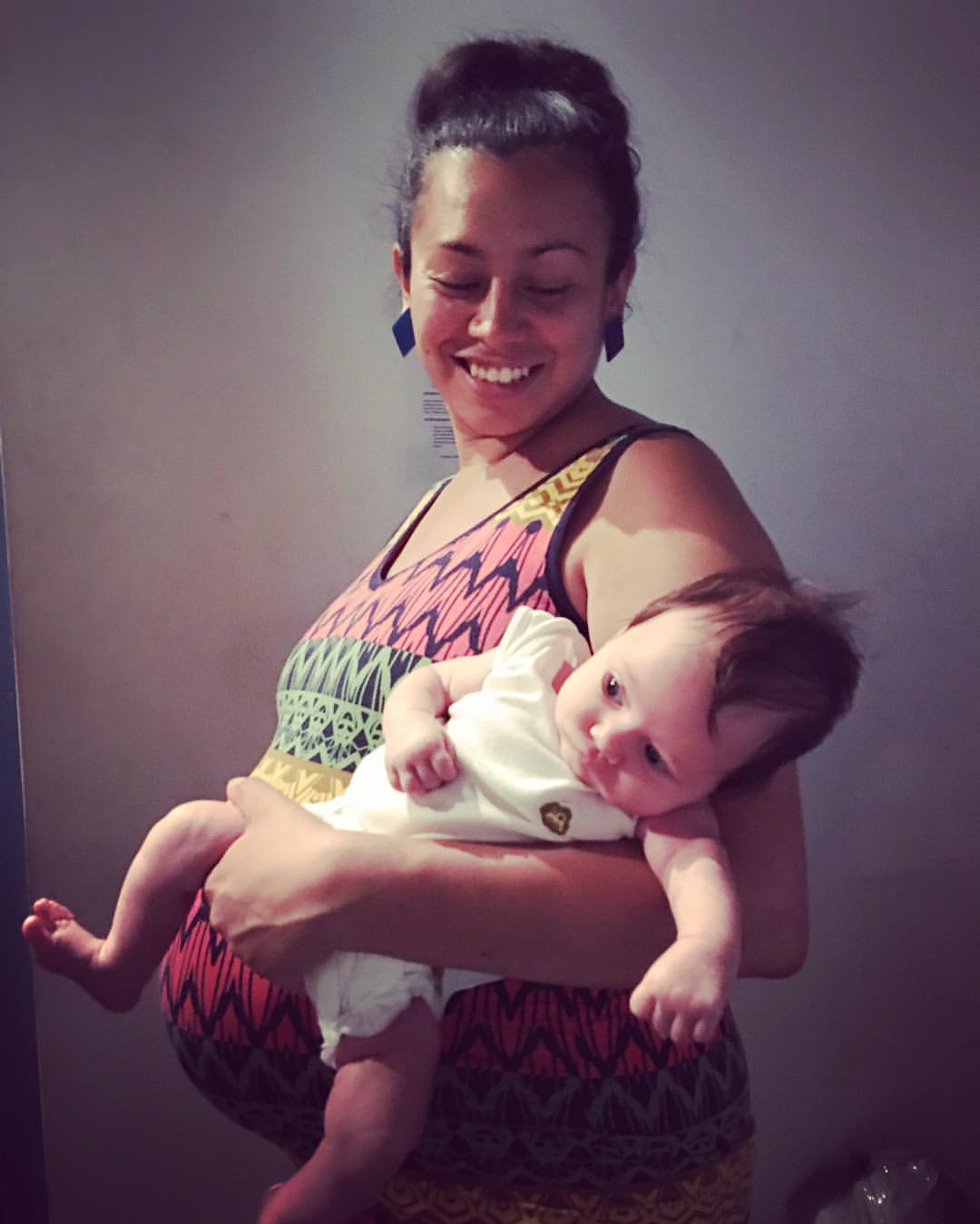It takes a Village
September 1, 2016
Three women stand in a line, their shadows blown up behind them as they move from side to side in jerky disjointed motions, their shadows move seamlessly behind them as white noise plays loudly in the background.
Choreographer Victoria Mata steps on to the stage to clean the intricate sequence that makes up “shifting” the moment and shadow piece I have been watching for the past ten minutes. I’m invited to watch the rehearsal process of ImShift* as they get ready for their upcoming shows at RUTAS panamericanas Festival.
While the team sets up for some table talk I’m invited to take a seat and join them. Before everyone else is at the table, I get a chance to briefly talk with co-director Janet Romero, while surrounded by chatter in Spanish, Portuguese, and English, and by some soft baby cries (dancer Amanda Paixao is in the studio with her month old baby, Izabel).
I ask Janet for some thoughts on the show, on the process, on this particular room and its dynamics. She looks around and after a couple of moments catches my eyes and says: “You see, right now for me it’s very much about the responsibility that comes with telling stories.” She goes on to talk about general notions on art, story telling, and tradition, particularly in works like ImShift which deals with experiences of migration, borders, and diaspora: “There’s that responsibility to honour the story in a way that is respectful of the collective. Like this show is a collective storytelling and we have a responsibly to do this in the best way we can; in a way that honours everyone who has even a fragment of what you are telling in their lives.” When Janet says “collective” it is clear to me that she means more than just the creative structure under which this show is being built; she means all of us everywhere, because we are all touched by migration to some extent. And then it strikes me: this production is not a show about migration catered for an immigrant audience.
Janet continues: “How do we do this in a way in which it’s clear that we’re aware of the privilege that we have to tell these stories, and the responsibility we have to tell them well and in a way that holds everyone’s stories as sacred and not dismissive? Every story deserves the same amount of love and tenderness, care and compassion, and work to develop it into something that someone who doesn’t know any of this could look at it and gain perspective from it.”
Photo cred: Victoria Mata. – From left to right: Victoria Mata, Janet Romero-Leiva, Tereka Tyler-Davis, Irma Villafuerte, Stephanie Caldeira
Later in that same rehearsal co-creator and choreographer Victoria Mata spoke to me about how the show itself is in constant shift. “We didn’t have to deal with motherhood in the beginning and now we have a baby with us as we navigate how to engage with each other, how to care of each other, it’s a constant, ‘you have her? [the baby] does she need to eat, now you take her so we can build this part…’ and this shift, it carries into the work.” As Mata says this, a breast feeding Amanda walks up to us to confirm that they are moving on to her segment of the show, she has some moves she wants to look at and so I watch as choreographer, dancer and infant delve into the work, they chat about some ideas and Amanda puts her baby in her portable crib and begins to dance .
Photo cred: Victoria Mata – From left to right Janet Romero-Leiva, Alejandra Higuera, Izabel
Love and tenderness and care and compassion. A couple of hours have passed and baby Izabel begins to whine, she’s okay but being a little fussy, rehearsal has been interrupted and we’re in an impromptu break, so Amanda comes to sooth her, she doesn’t pick her up, instead she leans in over the baby on her portable crib, which sits on a riser at the back on the studio, her whole torso covering her babe as she kisses her softly on the cheek. I can feel her moving love, like energy passing into her daughter, she is giving her calmness and tenderness, creativity, and pure love as she breathes slowly over her. I feel like I’m assisting to an intimate moment that I know very little about, Amanda seems like she’s entered another space where only her and Izabel are tangible, she’s not bothered by my closeness. I’m sitting on the riser not even two feet away from the crib, but they are comfortable and generous with their mother-daughter relationship. I look up and there’s a rehearsal room buzzing around us, it is quiet and tempered but vibrant. This room comfortably holds the qualities of nursery and studio.
Alejandra Higuera and Izabel
I ask Amanda how she’s doing. She smiles and says, “I’m okay, sore, still bleeding. It’s just hard you know, not being able to give 100% to the dance” she smiles again at me and looks down at baby Izabel. “…And then you look at her, and you say ‘it’s okay, that’s why, she’s why it’s okay not to be able to do 100%.”
From across the room I can hear co-creator and visual artist Alejandra Higuera utter a soft but firm moan. Mata is by her side rubbing her back, “I think it is just a mild contraction”, they look at each other with the best kind of shock and complicity and laugh. Higuera is due in September, but she seems convinced she will go into labour well before her due date.
I leave the rehearsal room filled with images and sounds of diaspora, of motherhood, of activism. Art is life, and a rehearsal room filled with babies born and to come, and with women and men who are there as team and as family is something that makes me feel lucky to be able to witness. The sense of community around that baby is precious, and it has permeated the deepest corners of the work being done in ImShift.
By: Ximena Huizi
*ImShift is a collage of contemporary dance, poignant visuals and original percussive sounds that untangle our perpetual relationship to ‘la frontera’ (the border). Exploring the liminal spaces of living in the in-between making sense of two languages and two cultures, ImShift highlights the constant experience of bridging the South and the North. This visceral performance narrates stories of our re-created terrain where complexities of identity, resistance, healing and survival exist within each other.
Ximena Huizi is a member of CANACOS, a group of Latin Canadian professional theatre artists supported by Aluna, who will act as artistic ambassadors throughout RUTAS panamericanas 2016. Tickets for ImShift and all festival presentations are now available at www.rutas.ca.



